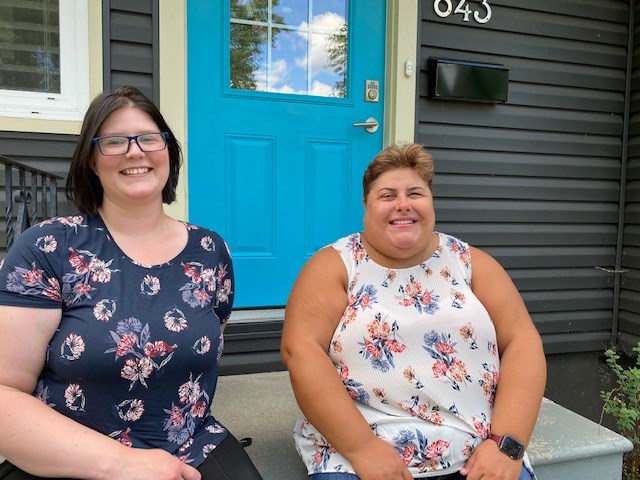THUNDER BAY — For Dawnelee Wright, the COVID-19 pandemic has brought into even sharper focus the need to maintain supports for people with sensory impairment.
The Thunder Bay woman lives with deafblindness, which is a combination of hearing and vision loss.
Wright was born blind, and in 2016 contracted a virus that led to neuropathic hearing loss.
DeafBlind Ontario Services was able to arrange for an intervenor – a person who's professionally trained to guide, support and communicate with clients.
"It just makes such a difference, because you have independence, you have privacy, you have freedom," Wright told tbnewswatch.com in an interview.
She said her intervenor, Samantha Deenik, accompanies her on outings and helps around the home, "interpreting anything that is visual or auditory. And I have to admit she goes beyond that. She's become like a member of the family."
With Deenik's assistance, Wright – who is a wife, mother of two, student and part-time worker – is able to maintain a pretty busy lifestyle.
"Let's say I want to do some cooking. She'll help me with the recipe. If I wanted to help the kids with homework she would read it to me so I could assist them. Even fun activities like doing puzzles, going to movies, doing shopping, leisure activities like going to the complex," she said.
Deenik, she said, fills in "all that visual and auditory information that I'm not receiving, particularly in public when the hearing piece becomes really complicated."
All that changed, however, when COVID-19 restrictions were implemented under Ontario's state of emergency.
Wright lost her intervenor's essential support for three months, when Deenik returned to southern Ontario to self-isolate.
"I felt at a loss. Without her, I can't do things independently from my family. I lost a sense of privacy too," she said.
With COVID-19, she found that very little was accessible to her.
"The plexiglass barriers, the masks that people are wearing, the arrows on the floor. I can't navigate a simple clothing store anymore. I can't see to follow the arrows, and I can't hear people's voices when they're masked or behind plexiglass."
Wright said she appreciates that the government and citizens have acted responsibly in trying to contain COVID-19, but she feels the disability community has been "a little bit marginalized" in the process.
She cited the example of stores allowing only one individual at a time to enter.
"Well, I have to enter with another, sighted person, and then you have to explain that. I'm deafblind, I need my intervenor, I need my husband, I need someone to accompany me. There's a whole level of challenges now that are really anxiety-provoking," she said.
Wright said social distancing can be extremely isolating for a person in her situation.
With the Ontario government relaxing its emergency orders, Deenik just recently returned to Thunder Bay to be at Wright's side once again.
"It was an amazing reunion. I was so excited. My kids were so excited," she said.
Wright said not having access to her communication partner because of COVID-19 was a stark reminder of what it would be like to not have an intervenor at all.
In future, she'd like to see more understanding and consideration of the needs of people in her situation.
"There are complex layers to life during a pandemic for everyone. But what if we add another layer to accommodations that must be made? What if a person is both deaf and blind?", she asked.
The lesson for all, Wright believes, is to be open-minded, and to realize that "there is still the right to accommodate. We still have the Ontarians with Disabilities Act, and I think we have to figure out how we adjust, how we accommodate and still protect."
Having to make frequent visits to the hospital – and not being allowed a companion due to COVID-19 restrictions – Wright said she appreciates that the nursing staff have recognized her special needs, and have gone "above and beyond."
She said she believes the retail and public service sectors can remain diligent during the pandemic, but still pause to consider the circumstances of each individual, and take steps to ensure everyone can access services in a fair way.
Across Canada, nearly half a million people are deafblind.
Deafblind Ontario Services www.deafblindontario.com says people with these conditions have inconsistent access to supports, because the provinces make varying degrees of funding available.
The organization says its services are customized to each client's unique needs, method of communication and goals, with the aim of increasing their independence and enriching their lives.
